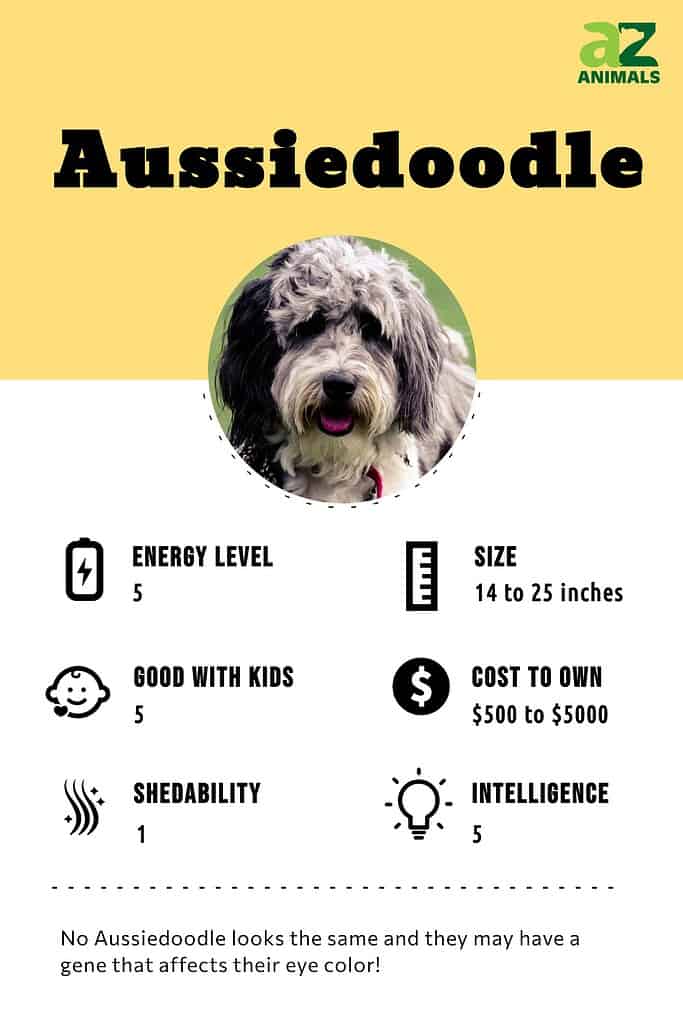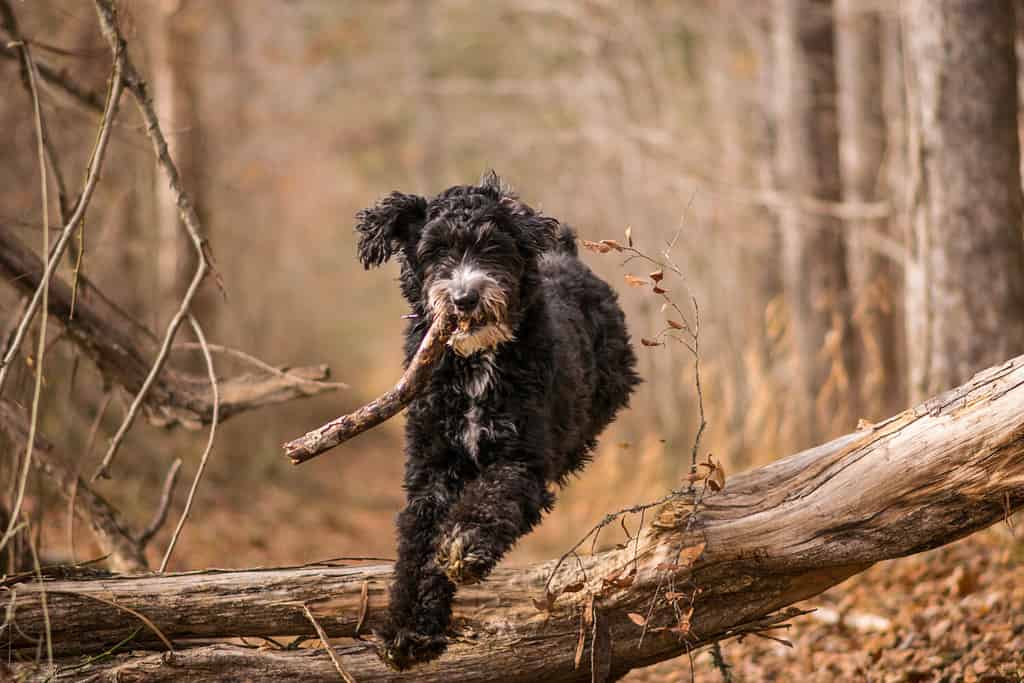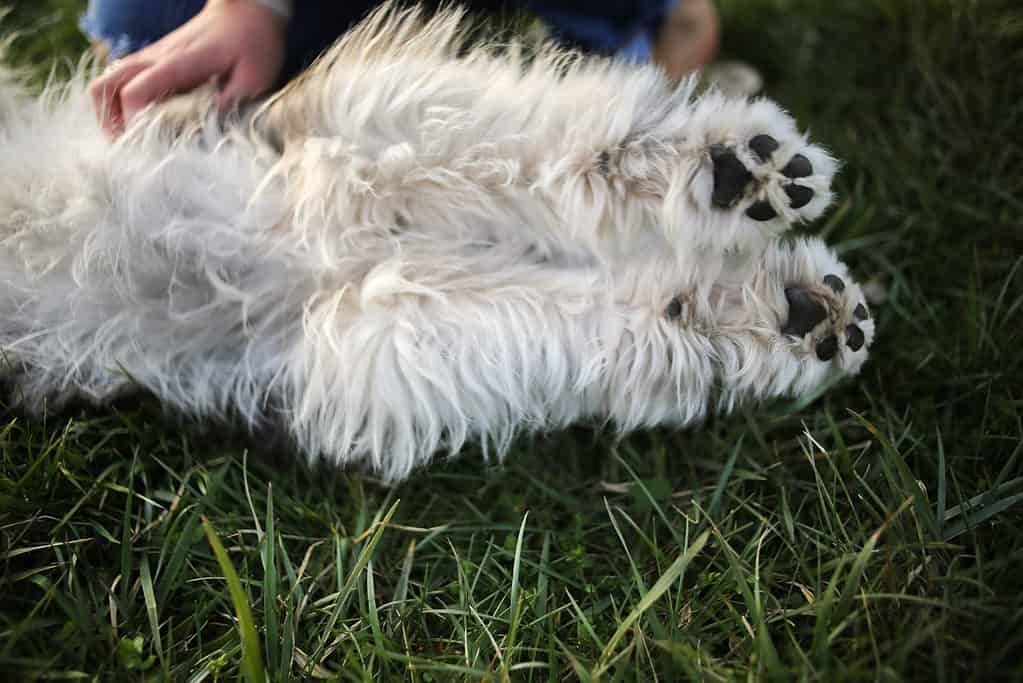What do you get when you mix an Australian shepherd and a poodle? An Aussiedoodle! Both breeds are popular pets. They are both low-maintenance, good with other dogs and children, playful, intelligent, and trainable. And when you combine them together, the result is an adorable family pet, but one that is high-energy and needs a lot of mental stimulation. A typical Aussiedoodle lifespan is 13-15 years. How can you help your dog live its fullest, longest life? Read on to find out.

Aussiedoodle Characteristics
Aussiedoodles and other popular poodle hybrids have only been around since the 1990s. They are appealing for their adorable looks; soft, curly, low-shedding hypoallergenic coats; good health; intelligence; and playful, good-natured temperament. Often, they seem to combine the best features of both their parents.
Aussiedoodles of both sexes grow to about 14-25 inches tall and can weigh 20-75 pounds. The wide size differences depend on the parents, such as whether the poodle parent was a standard or miniature breed. They are athletic, alert, and smart. Because they are a herding breed, they need to be trained not to nip at children and need plenty of exercise and mental stimulation to avoid destructive behaviors from separation anxiety.
Factors Affecting Dogs’ Lifespans
Depending on the breed, dogs can live anywhere from seven to 16 years, on average. The Aussiedoodle lifespan is near the upper end of this range, at 13-15 years. However, a lot of factors can influence the lifespan of an individual dog. The oldest dog on record was Bluey, an Australian cattle dog that died at the extraordinary age of 29.5! He set this record in 1939 and it hasn’t been beaten yet. Here are some things to consider when estimating a dog’s lifespan:
Time and Love

Don’t let your Aussiedoodle feel neglected! Love and attention can actually increase its lifespan.
©Claudia Naerdemann/Shutterstock.com
So, what are some of the things that determine how long a dog will live? Well, first of all, just loving your dog can help it outlive the average for its breed. Of course, a dog with a relatively short lifespan was not necessarily unloved. But when a dog gets a lot of love and attention it reduces stress and releases oxytocin, a “feel good” hormone that helps mammals bond. Spending time talking and playing with your dog also keeps its mind active and relieves boredom, which contributes to overall health.
Exercise and Nutrition

Aussiedoodles are highly active dogs that require exercise and mental stimulation.
©jlovephoto/Shutterstock.com
Of course, dogs need physical exercise and a good diet as well. Dogs that were bred for outdoor work can particularly suffer if they don’t have enough opportunities to exercise. Keeping them active is good for their heart, muscles, and overall good health, just as it is for a human. Feeding the dog high-quality dog food and abstaining from human food is essential. Dog foods are formulated to provide the necessary vitamins and minerals at each stage of life from puppyhood through old age. A well-nourished dog will have a system that is more resistant to disease and can recover more quickly from illnesses.
Veterinary Care

Regular veterinary care is an important part of extending the life of a dog of any breed.
©Ground Picture/Shutterstock.com
In the first year of a dog’s life as a family pet, it usually gets regular checkups because it needs its puppy vaccinations. After that year, though, some pet owners rarely make vet appointments for anything but required annual vaccinations. This is a mistake, as with regular checkups your vet can look out for problems that may emerge due to your dog’s age or breed.
Environment

Aussiedoodles live longer if they live in less-toxic environments and get mental and physical stimulation.
©Peggy McClure/Shutterstock.com
Dogs that live in environments with harsh weather experience more physical and mental stress, which can cause them to age more quickly. Dogs also spend a great deal of time sniffing the ground, snuffling up all kinds of germs and toxins, and eating anything that seems vaguely edible to them, including feces and decomposing garbage. And because they are smaller than a person, it doesn’t take as much of an environmental pollutant to cause a dog to get sick. If a dog is allowed to roam freely in a rural area it can get into fights with wild animals that can injure them and spread disease. A family that keeps a clean house and doesn’t allow their dog to roam all over the place will find the animal has greater chances for a long life.
Genetics

Aussiedoodles can suffer from skin infections that will need lifelong management.
©Holly Anne Cromer/Shutterstock.com
Generally speaking, dogs of smaller breeds live longer than large breeds, on average. Some breeds are more susceptible to serious health issues. Dogs with deeply wrinkled skin may more easily get infections. Those bred with short noses sometimes have more respiratory problems. Some dogs are particularly prone to hip dysplasia, collapsing esophagus, joint problems, cancer, or heart failure. Even an individual dog from a breed that normally has few health problems can have issues because of inbreeding or other weaknesses in its birth line.
Aussiedoodles can have genetic problems that come from both their poodle and their Australian shepherd lines. Thyroid disease is the most common genetic problem for Australian shepherds. From the poodle side, an Aussiedoodle can suffer from sebaceous adenitis, an incurable inflammatory skin disease, or bloat, a potentially fatal gastrointestinal problem. Hip and elbow dysplasia are common issues in medium and large dog breeds, including Aussiedoodles.
The Bottom Line

©Steve Bruckmann/Shutterstock.com
The average Aussiedoodle lifespan of 13-15 years is near the upper end of what can be expected from any dog breed. Individual dogs may have shorter lifespans because of poor breeding or environmental factors that may be outside the owner’s control. However, if an Aussidoodle’s human feeds them nutritious food, takes them regularly to the vet, and gives them plenty of love, physical, and mental stimulation, then there is a chance the dog can significantly outlive the average Aussidoodle lifespan.
The photo featured at the top of this post is © Steve Bruckmann/Shutterstock.com
Ready to discover the top 10 cutest dog breeds in the entire world?
How about the fastest dogs, the largest dogs and those that are -- quite frankly -- just the kindest dogs on the planet? Each day, AZ Animals sends out lists just like this to our thousands of email subscribers. And the best part? It's FREE. Join today by entering your email below.
Thank you for reading! Have some feedback for us? Contact the AZ Animals editorial team.






